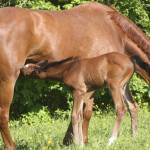Early Immunization is Effective in Young Foals

Born with an immature immune system, neonatal foals gain protection against disease by absorbing the antibodies provided in the dam’s colostrum. In foals that have received adequate colostrum in the first hours after birth, maternal antibodies offer protection for several months until the foal is able to develop its own resistance. Eventually the level of protection from maternal antibodies wanes, so foals are scheduled to begin vaccination series against common bacteria and viruses by the time they are about six months old.
A research project led by veterinarians from Kansas State University and Pfizer Animal Health evaluated the effect of vaccinating foals at three versus six months of age. Twelve healthy foals that had received adequate colostrum were divided into two groups. Foals in one group were given a three-dose multivalent vaccine beginning at 90 days of age. Those in the other group received the same treatment beginning at 180 days of age. Vaccine antigens that were administered included eastern and western equine encephalomyelitis, West Nile virus, equine influenza virus, equine herpesvirus, and tetanus toxoid.
Testing of immunity levels was conducted 30 days after immunization and also when all foals were 11 months old. Early-vaccinated and later-vaccinated foals showed comparable expression of several immune indicators. This shows that young foals are capable of immune activation at an age when maternal antibodies are still present. The authors suggest that in high-risk situations, such as when young foals may have had exposure to diseases, vaccination at three months can result in immune activation, giving these young horses the best chance to stay healthy. The first three-dose vaccination should always be followed up by a booster immunization at 11 months of age.








